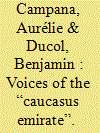| Srl | Item |
| 1 |
ID:
151231


|
|
|
|
|
| Summary/Abstract |
Track II diplomacy, or unofficial interactions designed to produce ideas, build relationships, and change perceptions, has become a supplement – and sometimes an alternative – to traditional diplomacy. Yet practitioners and scholars still debate its effectiveness. Practitioners claim that Track II diplomacy promotes peace but insist that its contributions are intangible and therefore difficult to assess empirically. Meanwhile, scholars maintain that only rigorous empirical evaluation can demonstrate the effect of Track II diplomacy on conflict outcomes. This study seeks to break this impasse in two ways. First, it provides a comprehensive explanation of why Track II practitioners object to evaluation, drawing on personal interviews conducted in eight countries. Second, it proposes a new evaluation framework, which we call the “Process Peace” approach, which better balances practitioner and scholarly equities. Our framework should appeal to readers interested in bridging the gap between the practice and theory of Track II diplomacy.
|
|
|
|
|
|
|
|
|
|
|
|
|
|
|
|
| 2 |
ID:
140867


|
|
|
|
|
| Summary/Abstract |
This article looks at Internet use by insurgent groups in the North Caucasus in the context of a regional diffusion of violence. Using a mixed methods research design that combines hyperlink network analysis and micro-discourse analysis, it examines the online characteristics of the Caucasus Emirate and the main frames conveyed by the websites affiliated with the Emirate. It demonstrates the existence of a network of cross-referencing websites that, collectively, articulate the Emirate's political agenda online and allow for the dissemination of frames across the Web. It also shows that while jihadism provides a cultural resource that fosters a global sense of community, the jihadization of discourse does not eradicate local references as the local dynamics of the conflict have a strong impact on online communicative strategies. Finally, although based on a specific case study, this article highlights the potential of a mixed methods research design as applied to an analysis of virtual insurgent networks.
|
|
|
|
|
|
|
|
|
|
|
|
|
|
|
|